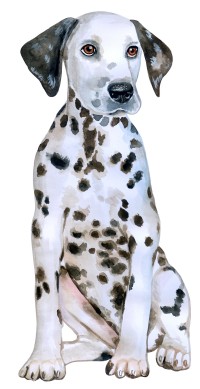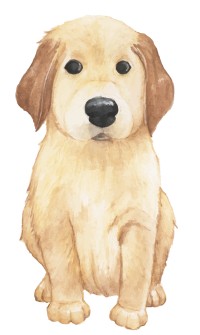Housebreaking Problems
By Michele Welton, Dog Trainer, Breed Selection Consultant, Author of 15 Dog Books
Here are the most common problems I encounter during housebreaking:
- Pup is reluctant to eliminate outdoors.
- Pup will eliminate outdoors, but also goes in his crate.
- Pup is doing good during the day, but eliminates in his crate overnight.
- Pup is repeatedly peeing, both in and outside of his crate.
- Pup is pooping more than three times a day.
Let's look at each problem in more depth.
Problem: Pup is reluctant to eliminate outdoors.
Is your dog eliminating mostly indoors in his crate? Does he seem reluctant to pee or poop outdoors?
- Increase your frequency of trips outside. Say, every hour instead of every two hours. If he doesn't go when you take him out, put him in his crate for 10 or 15 minutes, then try again. And again.
- Some pups are fussy about their footing. They might dislike walking on short mown grass, which can feel prickly. Or they might dislike wading through long grass. So try looking for a different type of footing.
- Some pups are nervous about eliminating where they can see or hear other dogs. Again, scout around for a quieter place?
- Some pups dislike bad weather and might need an umbrella held over their head, as surreptiously as possible, haha, good luck! Unfortunately many toy breeds hate cold/wet weather so much that you should either construct a roof over a selected potty area, or teach them to use an indoor potty yard or litterbox.
 Leave (or place) one of your pup's stools in the area you want him to go. If he sniffs at your "hint", praise quietly. "Good boy, go potty."
Leave (or place) one of your pup's stools in the area you want him to go. If he sniffs at your "hint", praise quietly. "Good boy, go potty."- Make sure you're not walking around. Stand still and let him wander around you within the length of the 6-foot leash. Think of yourself as the sun, with your dog making circular orbits around you.
- Make sure you're not letting the pup just stand there doing nothing. If he turns into a statue, take a few steps in any direction and use the leash to remind him to keep moving. A pup can't go to the bathroom if he's just standing or sitting there.
- Make sure you're not distracting the dog by talking to him, making eye contact, or touching him.
- Make sure you're praising and rewarding with a treat immediately when your pup has either peed or pooped. But don't fish around in your pocket while he's still "going" or you might distract him. Wait until he's done before you even reach for the treat.
Problem: Pup will eliminate outdoors, but also goes in his crate.
Look on the bright side: he's doing half of it right! Now we just need to get him to STOP going indoors.
- Make sure the crate is small enough. The pup should have just enough room to turn around and lie down comfortably, but no extra room.
- Make sure you're taking him out frequently – at least every two hours. Every hour if you can manage it.
- Make sure there is no food or water in the crate.
- Make sure there's no soft bedding in the crate. It absorbs urine, which makes the pup more comfortable. Whereas, if he pees in the crate, he should a bit uncomfortable, which might motivate him to keep his crate clean. For crate piddlers, I put in newspapers; they do absorb some urine, but less than soft bedding.
- Monitor his mealtime/potty schedule. For example, maybe you're waiting too long to get him outside after he eats. Every pup is different in how soon he needs to eliminate after eating.
Problem: Pup is doing good during the day, but still eliminates in his crate overnight.
- Pick up water at 7 pm.
 Experiment with meal times. Try an evening meal at 6 or 7 pm, then out to potty every two hours until midnight. Hopefully he will move his bowels during one of those outings. Conversely, try pushing his evening meal up to 10 pm, then out to potty at midnight and hope he will sleep all night without needing to poop. There is no one "right" schedule that fits all dogs.
Experiment with meal times. Try an evening meal at 6 or 7 pm, then out to potty every two hours until midnight. Hopefully he will move his bowels during one of those outings. Conversely, try pushing his evening meal up to 10 pm, then out to potty at midnight and hope he will sleep all night without needing to poop. There is no one "right" schedule that fits all dogs.- Make sure you get the pup outside first thing in the morning, like at 6 am. Wear your clothes to bed if necessary, so you can get him out fast. Two minutes can make all the difference when a pup is experiencing problems.
Problem: Pup is repeatedly peeing, both inside and outside of his crate.
If you're taking your pup out frequently, but he's still peeing both indoors and out, have your vet test him for a urinary tract infection and bladder stones.
If you've ever had a UTI, you know how awful it feels to have those sudden, uncontrollable urges.
When your pup's housebreaking issues are mostly urination issues, get his urinary system checked out ASAP. Not only for infections, but also for stones, which are quite common in some breeds.
Problem: Pup is pooping more than three times a day.
A dog might poop too much if he has a digestive ailment, but in the absence of additional symptoms, he's probably just being fed too much. Either fed too much or fed the wrong foods because...
...pups poop more when their food contains ingredients that canines don't digest well, such as grains, cereals, and other carbohydrates. These often go right through a dog, producing a lot of waste. (Read more here and here.)
Are there some dogs who simply can't be housebroken?
 Yes, some so-called "dirty dogs" regularly eliminate in their crate, then sit or lie in it without seeming to notice.
Yes, some so-called "dirty dogs" regularly eliminate in their crate, then sit or lie in it without seeming to notice.
You can do everything right and these dogs seem to have no clue that they're supposed to keep their sleeping quarters clean.
Most often, a "dirty dog" wasn't born that way – rather, his early upbringing failed to lay the foundations for later housebreaking.
- "Dirty dogs" usually originate in a pet shop or puppy mill. In both places, the puppies eliminate on the wire floor of their small cage, wherever they happen to be standing. What doesn't fall through the wire then gets stepped in by the pup, who soon learns not to care about cleanliness or the lack thereof.
- Or a "dirty dog" might have come from a breeder who didn't offer a separate area of newspapers or wood shavings where the infant pups could toddle over and eliminate away from their sleeping blanket.
If you don't yet have your pup, the paragraphs above might make you think twice about acquiring one from a dubious source.
But many owners are certain they have one of these hopeless dogs when in fact it's the owner who isn't doing something right. A frustrated owner will swear he's tried everything. But when I arrive for a consultation, I almost always find at least one thing the owner is doing that should be altered.
It's actually good news how quickly most pups will respond if you just do that one little thing you skipped over. So don't give up hope until you really have tried everything in all of my housebreaking articles.
My best-selling books – now available FREE on my website
 Respect Training For Puppies: 30 seconds to a calm, polite, well-behaved puppy is for puppies 2 to 18 months old. Your puppy will learn the 21 skills that all family dogs need to know. Click here to read for free.
Respect Training For Puppies: 30 seconds to a calm, polite, well-behaved puppy is for puppies 2 to 18 months old. Your puppy will learn the 21 skills that all family dogs need to know. Click here to read for free. Teach Your Dog 100 English Words is a unique Vocabulary and Respect Training Program that will teach your adult dog to listen to you and do what you say. Click here to read for free.
Teach Your Dog 100 English Words is a unique Vocabulary and Respect Training Program that will teach your adult dog to listen to you and do what you say. Click here to read for free. 11 Things You Must Do Right To Keep Your Dog Healthy and Happy helps your dog live a longer, healthier life. Get my honest advice about all 11 Things before you bring home your new puppy, because some mistakes with early health care cannot be undone. Click here to read for free.
11 Things You Must Do Right To Keep Your Dog Healthy and Happy helps your dog live a longer, healthier life. Get my honest advice about all 11 Things before you bring home your new puppy, because some mistakes with early health care cannot be undone. Click here to read for free.
